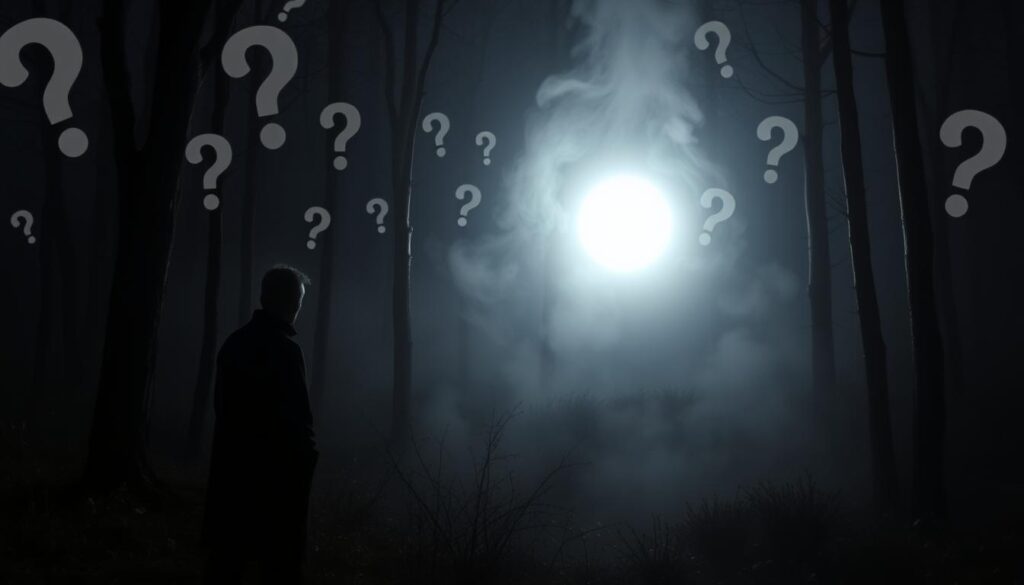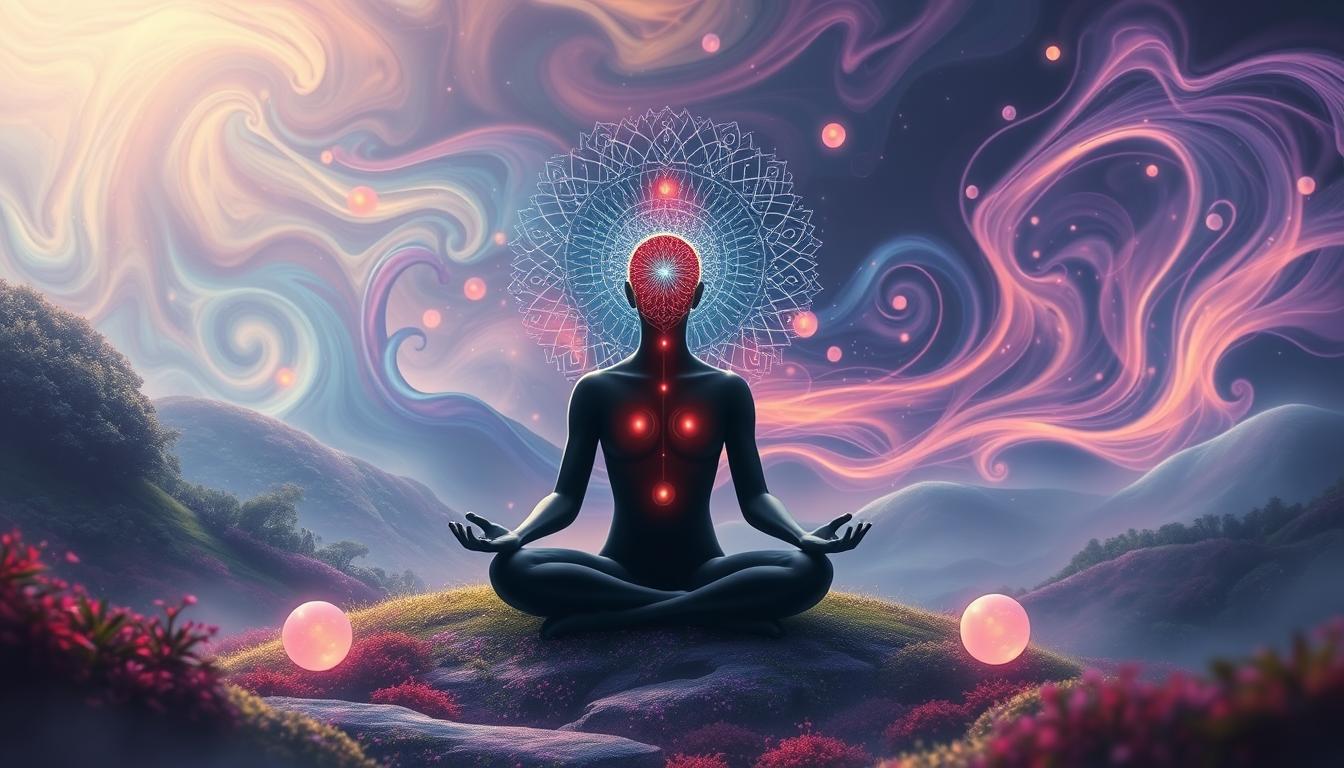Ever had a gut feeling that came true? Or a vivid dream that seemed to predict something? These might be signs of extrasensory perception (ESP). ESP, or the sixth sense, is about sensing things beyond our five senses.
ESP has fascinated people for centuries. Stories of supernatural powers are common. Some believe in psychic abilities, while others think it’s just trickery.
In this article, we’ll explore ESP. We’ll look at its different types, the science behind it, and the debates around it. Whether you believe in psychic powers or are skeptical, this guide will help you understand ESP better.
Key Takeaways
- ESP refers to the alleged ability to perceive information beyond the five physical senses
- The concept of ESP has intrigued humanity for centuries, with stories of individuals possessing supernatural powers
- ESP encompasses various forms, such as telepathy, clairvoyance, precognition, and psychokinesis
- The scientific community remains divided on the validity of ESP, with ongoing research in the field of parapsychology
- ESP has been a popular subject in media and culture, inspiring countless books, movies, and TV shows
Introduction to ESP
Ever had a moment where you felt like you knew something before it happened? These moments, known as extrasensory perception (ESP), have long intrigued us. ESP includes psychic powers that go beyond our usual senses.
Defining Extrasensory Perception
ESP lets us get information that our five senses can’t. People with ESP are thought to have paranormal gifts. They can:
- Read others’ thoughts (telepathy)
- Perceive distant events (clairvoyance)
- See into the future (precognition)
- Influence physical objects with the mind (psychokinesis)
Many people claim to have had ESP experiences. But, the science behind it is still up for debate.
Brief History of ESP Research
The study of ESP, or parapsychology, started in the late 1800s. Some important moments in ESP research are:
| Year | Event |
|---|---|
| 1882 | Society for Psychical Research founded in London |
| 1930s | J.B. Rhine conducts ESP experiments at Duke University |
| 1970s | U.S. government launches the Stargate Project to study psychic phenomena |
“The day science begins to study non-physical phenomena, it will make more progress in one decade than in all the previous centuries of its existence.” – Nikola Tesla
Despite the debates, the interest in intuitive powers keeps parapsychology alive. It’s all about exploring the mysteries of our minds.
Types of Extrasensory Perception
Extrasensory perception, or ESP, includes various psychic abilities. These allow people to get information beyond the usual five senses. Psychic mediums and clairvoyants often have these abilities, claiming to have strong intuition. Let’s look at the four main types: telepathy, clairvoyance, precognition, and psychokinesis.
Telepathy: Mind-to-Mind Communication
Telepathy lets people send thoughts, feelings, or messages without words. It’s a direct link between two minds, sharing information silently. This usually happens between those with a deep emotional connection, like twins or close friends.
Clairvoyance: Perceiving Beyond the Physical Senses
Clairvoyance means seeing beyond what our senses can. It lets people describe places, events, or objects they’ve never seen before. This ESP is key in psychic readings, where a medium shares insights into someone’s life or future.
Precognition: Knowing Future Events
Precognition is knowing about future events before they happen. It can show up in dreams, visions, or sudden feelings. Many have had dreams that came true, or felt déjà vu when they knew a situation was familiar.
Psychokinesis: Mind Over Matter
Psychokinesis, or telekinesis, is moving objects with the mind. It’s about bending or moving things without touching them. While it’s debated, some think it can be studied and measured in labs.
“The most beautiful thing we can experience is the mysterious. It is the source of all true art and science.” – Albert Einstein
The Science Behind ESP
Extrasensory perception (ESP) is studied in parapsychology. This field looks into paranormal phenomena and psychic abilities. Many studies have tried to figure out if ESP is real.
Parapsychology and ESP Studies
Parapsychologists use different methods to study ESP. They do experiments, case studies, and surveys. Some famous ESP experiments include:
- The Ganzfeld Experiment: It tests telepathic communication in a sensory deprivation setting.
- Remote Viewing Studies: People try to get information about far-off places using their intuition.
- Precognition Tests: These tests see if people can predict future events through ESP.
Some studies show interesting results, but scientists are still unsure about ESP. Critics say many experiments are not controlled well. They think ESP can be explained by chance or other factors.
Theories Explaining Extrasensory Perception
Many theories try to explain ESP, but none are proven yet. Some of these theories are:
| Theory | Description |
|---|---|
| Quantum Entanglement | It suggests ESP might be linked to how particles connect at a quantum level. |
| Psi Field Theory | This theory says there’s a universal field that lets minds share information. |
| Electromagnetic Theories | These theories think ESP might involve sending and receiving electromagnetic signals. |
Parapsychologists keep researching to find more evidence for ESP. They want to understand how people can get information beyond their senses. By studying ESP, we might learn more about our minds and consciousness.
Developing Your Intuitive Powers
Unlocking your psychic intuition and spiritual gifts is a journey of self-discovery. It’s about growing and learning more about yourself. By nurturing your abilities, you can gain deep intuitive insights and valuable spiritual guidance.
Developing your intuition takes practice and dedication. It’s a skill you can improve over time.
Meditation and mindfulness are great ways to grow your intuition. They help quiet your mind and let your inner wisdom shine. By sitting still and observing your thoughts, you can hear your intuition’s whispers.
Keeping a dream journal is another effective tool. Dreams often carry messages and intuitive insights for us. Write down your dreams and symbols when you wake up. Over time, you’ll see patterns that offer wisdom.
“Intuition is the whisper of the soul.” – Jiddu Krishnamurti
Engaging in creative activities like writing or painting can also unlock your intuition. Creativity takes you to a higher state of consciousness. Here, intuitive insights can flow freely. Let yourself create without judgment and trust the wisdom that comes.
Remember, growing your intuition is a lifelong journey. Be patient and trust the process. As you nurture your psychic intuition and spiritual gifts, your ability to receive spiritual guidance and offer psychic readings will grow.
Famous ESP Experiments and Cases
Many experiments have been done to study extrasensory perception (ESP). These studies aim to prove the existence of telepathy, clairvoyance, and precognition. We will look at some famous ESP experiments and cases that have caught everyone’s attention.
The Ganzfeld Experiment
The Ganzfeld experiment is well-known. It started in the 1970s. A person (the “receiver”) is in a state of sensory deprivation. Another person (the “sender”) tries to send mental images to the receiver.
The receiver then describes what they experienced. This is compared to the images sent by the sender. Some studies have shown that telepathic communication might be real.
The Stargate Project
The Stargate Project was funded by the CIA. It looked into using remote viewing for gathering intelligence. Remote viewing is when someone uses extrasensory means to get information about distant places or events.
The project ran from the 1970s to the 1990s. A team of psychics tried to get information about hidden objects or foreign military installations. Though it showed some interesting results, it was stopped due to doubts about its science and usefulness.
Noteworthy ESP Practitioners
Some people have become famous for their ESP abilities. Uri Geller, an Israeli illusionist and self-proclaimed psychic, is one. He became famous in the 1970s for claiming to have telepathy, psychokinesis, and the ability to bend spoons with his mind.
While some tests with Geller showed positive results, others questioned his abilities. They thought he might have used tricks instead of real psychic powers.
Edgar Cayce, known as the “Sleeping Prophet,” is another famous ESP practitioner. He claimed to enter a trance state to access information about health, past lives, and future events. He gave thousands of psychic readings throughout his life. Though his abilities are not scientifically proven, his case is one of the most intriguing in ESP history.
| ESP Practitioner | Alleged Abilities | Famous Cases |
|---|---|---|
| Uri Geller | Telepathy, psychokinesis, spoon bending | Demonstrated abilities on television shows and in controlled experiments |
| Edgar Cayce | Clairvoyance, psychometry, divination | Provided thousands of psychic readings on health, past lives, and future events |
“The day science begins to study non-physical phenomena, it will make more progress in one decade than in all the previous centuries of its existence.” – Nikola Tesla
These famous ESP experiments and cases have greatly influenced our understanding of extrasensory perception. While some studies have shown interesting results, the scientific community is still divided. As research continues, it’s important to keep an open and critical mind. We must try to understand the mysteries of human consciousness and the limits of our perception.
Skepticism and Criticism of ESP
Many people believe in extrasensory perception (ESP) and other paranormal phenomena. But, there’s a lot of doubt and criticism about these claims. Skeptics say the evidence for ESP is mostly stories, lacks scientific proof, and can be explained in simpler ways.
One big argument against ESP is that there’s no clear way it works. Despite lots of research, no solid proof of supernatural powers has been found. Critics say that if something seems too good to be true, it probably is. They believe we need stronger evidence than what we have now.
Common Arguments Against ESP
Skeptics have several reasons to doubt ESP. Here are a few:
- Confirmation bias: People tend to look for and see what they want to believe.
- Selective memory: They remember the times they got it right but forget the times they got it wrong.
- Coincidence: They might think random events are connected when they’re not.
- Sensory cues: They might pick up on tiny clues that affect their thoughts or actions without realizing it.

Debunking Alleged ESP Phenomena
Trying to prove ESP wrong often means testing it in a controlled setting. For example, in tests of psychokinesis, the results can be explained by mistakes in the test or even cheating. Similar things happen with claims of precognition or premonition. These can be explained by how people remember things, their own biases, or just chance.
Here’s a table showing some famous ESP claims and why skeptics doubt them:
| Alleged ESP Phenomenon | Skeptical Explanation |
|---|---|
| Telepathy | Sensory cues, cold reading, confirmation bias |
| Clairvoyance | Selective memory, coincidence, fraud |
| Precognition | Confirmation bias, selective memory, law of large numbers |
| Psychokinesis | Methodological flaws, statistical artifacts, fraud |
The debate on ESP is ongoing. But skeptics say those making these claims need to prove it. Until we have solid, repeatable evidence, many will think ESP is just a mix of misunderstanding, bias, or wishful thinking, not real paranormal phenomena.
ESP in Popular Culture
Extrasensory perception (ESP) has always been a topic of interest in movies, TV shows, and books. Classics like “The Dead Zone” and “Medium” have made us wonder about clairvoyance, telepathy, and more. These stories make us think about the idea of intuition beyond what we can see and hear.
ESP in Movies, TV Shows, and Books
ESP has been shown in many ways in entertainment. Some examples are:
- “The Sixth Sense” (1999) – A young boy can see and talk to ghosts. He seeks help from a child psychologist.
- “Minority Report” (2002) – In a future, psychics called “precogs” predict crimes. A police officer is accused of a crime he hasn’t done yet.
- “Heroes” (2006-2010) – This TV series has characters with supernatural powers, like telepathy and precognition.
- “The Shining” (1977) – Stephen King’s novel and film tell of a family in a haunted hotel. The young son has strong psychic powers.
Celebrity Psychics and Mediums
ESP has also made some people famous. These celebrity psychics and mediums are known for their claims of special abilities. They often appear on TV, do live shows, and write bestselling books. Some famous ones are:
| Name | Claim to Fame |
|---|---|
| John Edward | Host of “Crossing Over,” known for talking to the dead |
| Sylvia Browne | Appears on talk shows, writes about psychic abilities and spirituality |
| Theresa Caputo | Star of “Long Island Medium,” known for her mediumship readings |
| Tyler Henry | Appears on “Hollywood Medium,” gives readings to celebrities |
Even though some question their real abilities, these psychics and mediums are very popular. They show our deep interest in ESP and the unknown. As Albert Einstein once said:
“The most beautiful thing we can experience is the mysterious. It is the source of all true art and science.” – Albert Einstein
Whether you think you’re psychic or just find it interesting, ESP in movies and books keeps us talking. It makes us think about how we see and understand the world.
Honing Your Psychic Abilities
Developing your intuitive powers and tapping into your psychic development is a journey of self-discovery. It’s about unlocking your supernatural gifts and exploring the metaphysical powers. With dedication and practice, anyone can grow their extrasensory perception and connect with the unseen world.

Meditation and Mindfulness Practices
Meditation and mindfulness are key for nurturing your psychic abilities. They quiet your mind and open you up to intuitive insights. Regular practice can make you more sensitive to subtle energies and improve your psychic impressions.
- Enhance your sensitivity to subtle energies and vibrations
- Improve your ability to receive and interpret psychic impressions
- Cultivate a deep sense of inner peace and clarity
Intuition Development Exercises
Exercises can strengthen your intuitive muscles. Try psychic reading with friends or online, intuitive writing, or psychometry. These activities help you trust your intuition and access psychic information.
- Psychic reading practice with friends or online communities
- Intuitive writing or automatic writing sessions
- Developing your clairsentience through psychometry (holding objects to receive impressions)
Regular practice in these exercises will make you more confident in your intuition. You’ll get better at accessing psychic information when you need it.
Recognizing and Interpreting Psychic Signals
Learning to recognize and interpret psychic signals is crucial. Psychic information can appear in many ways, like vivid dreams or sudden knowings. Pay attention to these signs and trust the guidance they offer.
- Vivid dreams or waking visions
- Sudden knowings or “gut feelings”
- Tingling sensations or goosebumps
- Synchronicities and meaningful coincidences
With time and practice, you’ll become better at discerning psychic signals. You’ll learn to navigate the psychic realm with confidence.
“The intuitive mind is a sacred gift and the rational mind is a faithful servant. We have created a society that honors the servant and has forgotten the gift.” – Albert Einstein
Trust in your journey to develop your psychic abilities. Unlocking your supernatural gifts and deepening your spiritual awareness will connect you to the universe’s mysteries. You’ll discover your own infinite potential.
What is ESP: A Comprehensive Overview
Extrasensory perception, or ESP, has fascinated people for centuries. It’s a part of psychic abilities and paranormal phenomena. ESP gives us intuitive insights and spiritual guidance.
ESP lets us sense information beyond our five senses. It comes in different forms, each with its own special traits and uses.
Distinguishing Between Different Forms of ESP
To understand ESP, we need to know its different types. Some common types include:
- Telepathy: The ability to share thoughts and feelings directly, without using our senses.
- Clairvoyance: Seeing or sensing things beyond our normal sight, through visions or mental pictures.
- Precognition: Knowing what will happen in the future, through dreams or gut feelings.
- Psychokinesis: Changing things with our minds, like moving objects or events.
The Role of ESP in Personal and Spiritual Growth
ESP is more than just interesting. It helps us grow personally and spiritually. It lets us understand ourselves and the world better. This awareness helps us discover ourselves, feel empowered, and connect with our spiritual side.
“The intuitive mind is a sacred gift and the rational mind is a faithful servant. We have created a society that honors the servant and has forgotten the gift.” – Albert Einstein
Exploring ESP can also make us feel more connected to others and the universe. As we learn about our consciousness and the paranormal, we may find ourselves changing deeply. This journey can lead to spiritual awakening and personal growth.
| Type of ESP | Description | Potential Benefits |
|---|---|---|
| Telepathy | Mind-to-mind communication | Enhanced understanding and empathy |
| Clairvoyance | Perceiving beyond physical senses | Increased intuition and insight |
| Precognition | Knowing future events | Preparedness and decision-making |
| Psychokinesis | Mind over matter | Manifestation and empowerment |
ESP and Spiritual Awareness
Developing extrasensory perception and psychic intuition can greatly help in spiritual growth and self-discovery. As we tap into our supernatural powers, we feel a deep change in how we see the world. We connect more deeply with the divine.
Many spiritual traditions see ESP abilities like clairvoyant visions and telepathic communication as spiritual gifts. These gifts guide us on our soul’s journey. By growing these intuitive skills, we understand our life’s purpose and the connection of all things.
Meditation, energy work, and mediumship training open us to the spiritual world. They help us trust our intuition and follow our inner guide. This way, we align with our highest potential.
“The awakening of psychic abilities is often synonymous with an expansion of spiritual consciousness. As we open to the mysteries of the unseen world, we cannot help but be humbled by the vast intelligence and love that permeates the universe.”
ESP is more than just supernatural talents. It’s about deepening our connection to the sacred and living in harmony with life. By using our psychic gifts for spiritual growth, we evolve faster. We help awaken human consciousness worldwide.
Conclusion
We’ve explored the world of extrasensory perception, including ESP and its forms. Telepathy, clairvoyance, precognition, and psychokinesis are just a few examples. These abilities make us question the limits of our minds and the world around us.
Many people doubt ESP, but stories and studies hint at its reality. This makes us wonder if there’s more to these phenomena than we think.
Learning to use your psychic powers is a journey of self-discovery. It involves being mindful, meditating, and listening to your inner voice. It’s not about becoming a superhero right away. It’s about slowly learning to see and feel the world in new ways.
ESP fascinates people everywhere, whether they believe in it or not. As we learn more about it, we might find even more proof of its existence. So, stay open-minded, trust your gut, and explore the amazing abilities we all have.

